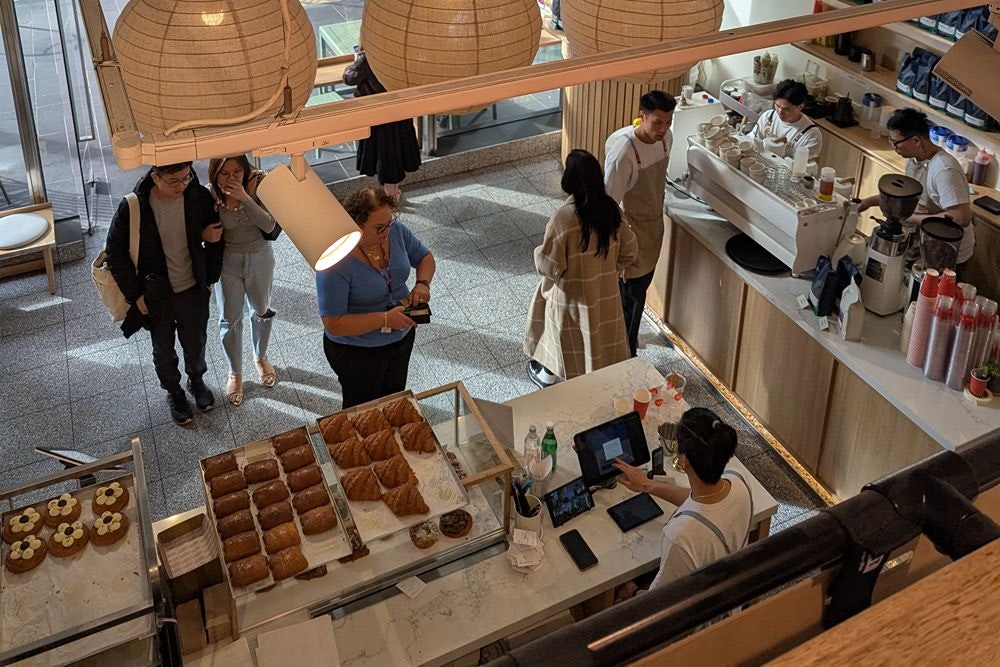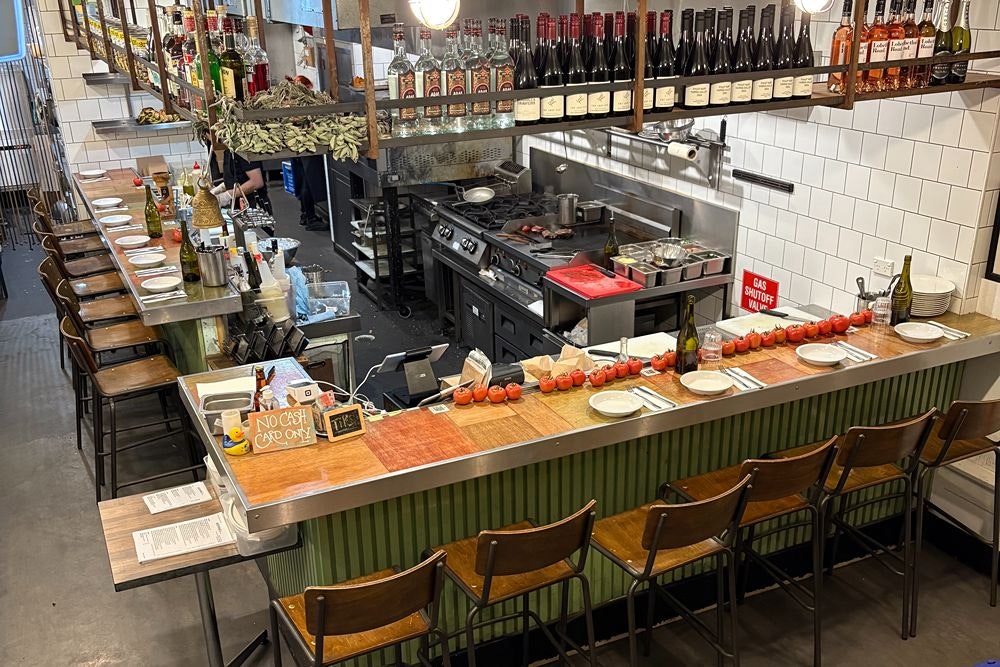Mega guide: Types of casual jobs for international students in Australia
Are you looking for work in Australia as a foreigner? Discover the best casual jobs for newcomers. From hospitality to construction, learn about requirements, salary, and how to get your first job in Aus!

By:
LINA AVILA HENAO
Last Updated:
Jun 3, 2025
Tags:
#work
In this post, we will explore the most common types of jobs for Latinos when they first arrive in Australia. As you'll see, there is a wide variety of things you can do, which you may not have done before but can turn out to be interesting and fun. However, there are jobs that are not as fabulous and may require more effort than others; here we tell you the truth.
Generally, the type of work depends on your level of English, your interests, and how well you handle the work. Starting a job doesn't mean you have to stay there forever; you can evolve and find better opportunities as you become more comfortable with English and improve your skills.
In this article, we will cover the most common industries, the types of jobs included in those industries, the requirements, and what to expect in these roles.
Before we begin, who is this article for?
For people who are looking for:
First job in Australia
Casual work
Who have:
A basic level of English
The right to work 24 hours a week.
If your visa conditions change and you settle in Australia, you can visit our practical tips for transitioning from a casual job to a professional role.
Let's get started now!
Common industries for casual work in Australia
Cleaning
Working in Australia as a cleaner is a normal job. No one is less than anyone for working in cleaning. Generally, it's an area that is always in high demand; the level of English needed is not very high, and the average hourly wage is good.
The person who works in cleaning is known as a "cleaner." It's a basic job that involves cleaning a specific space, whether it's a school, a business, a private house (housekeeper), a sports stadium, a restaurant, an office, or a hotel. The employer provides you with the tools, and you must follow instructions on which areas to clean. Typical activities include dusting, vacuuming carpets and floors, taking out trash, cleaning bathrooms, cleaning kitchens, and washing windows.
It's a job that requires physical effort and can sometimes be unpleasant (that depends on how you take it), but it can serve as a foundation while you improve your English and move into another position in a different industry.
Roles
There isn't much difference in roles here; the variation lies more in the tasks assigned. However, it is possible to advance to become Cleaner’s supervisor.
English Level
Basic
Average Pay
Around $23.23 to $29 AUD per hour. Public holidays typically have additional pay rates. Remember, the minimum wage in Australia is set at 23.23 AUD.
Certifications
You'll need a Police Check (background check), which can be done online in Australia.
If you're working in a school, you'll need a Working With Children Card (WWC). This credential is obtained after a review of your criminal record. If your record is clear, you're eligible to work in a place where minors are present, even if you're not directly interacting with them.
Pros
It may be quicker to find work in this field compared to others.
A high level of English is not required.
There are various schedules available, so you can choose what suits you best. For example, offices may need cleaning after hours, making it a night job.
Cons
Limited opportunity to practice English due to minimal interaction with others.
Physically demanding. Requires walking and cleaning throughout the shift. Sometimes, you may be exposed to sunlight for extended periods.
Cleaning bathrooms can sometimes involve unpleasant surprises.
After large events, the cleanup can be extensive.
How to Get a Job in this Industry
A good way is through classmates at your English language institute. Ask them where they work and if there are job openings there. You can ask if they can recommend you in their current job place or see their resumes to guide your own application.
Another method is to upload your resume to major companies that frequently hire, expressing your interest in working for them. During my time, some of the largest companies were:
Spotless
ISS Australia
Cirka
Consolidate
Another great option is to apply for positions in companies that handle major events throughout the year. They often hire many casual workers to fill numerous positions. A positive aspect is that if you perform well at one event, you may be called back for more shifts.
More recently, there are Apps where you can register, create a profile, describe yourself, and set your availability. The App connects people needing cleaning services with available workers in their area.
Types of Employment
You can work for a cleaning services company or as an independent contractor.
If you work for a company, they hire you and provide all necessary equipment (vacuum cleaner, disinfectants, protective gear).
If you work independently, you'll need to buy your own cleaning supplies and possibly transportation if you have multiple clients. Additionally, you'll need to obtain an ABN (Australian Business Number), which is similar to a Tax File Number but for independent work.
Types of contracts
It can be fixed-contract (the company assigns you a specific number of hours you can work with your type of visa) and you go at the same time on the days they specified.
Casual, they call you when they need you. Here, you must keep track of the hours you work.
Hospitality
Hospitality is a broad industry that offer services such as event planning and execution, hotel management, casinos, and food and beverage service. The goal is to create a pleasant and comfortable environment for guests attending specific events and to ensure they have an excellent experience. It involves working in shifts in the roles that I will mention below and serving people using different services professionally.

The pace of this industry is quite fast-paced with constant activity. Whether you're working at an event or in a restaurant, things are always changing. There's quite a bit of walking involved, and there may be some physical effort (carrying trays, serving drinks, carrying trays with multiple bottles), but overall, it's an enjoyable and fun job where time flies by. If you want to know more read here everything related to the hospitality industry.
Roles
There is a wide variety of positions available, depending on the following:
If you're facing the public directly, your job is focused on customer service and satisfaction. This is known as Front of House (FoH). Positions include:
Waiter/Waitress: Takes orders and serves food.
Runner: Delivers prepared food to tables. Note: Different from a waiter/waitress.
Hostess: Greets and seats guests.
Bartender: Serves alcohol.
Barista: Prepares coffee.
If the activities are behind the scenes without direct customer contact, then you're Back of House (BoH). Options here include:
Kitchen Hand: Assists in the kitchen.
Dishwasher: Cleans dishes.
Chef: Prepares food.
Food Plater: Arranges food on plates.
English Level
If you're in Front of House, a high level of English is required because you'll be interacting face-to-face with customers, taking orders, serving drinks, and possibly handling payments.
If you're in Back of House, the required English level is not as high but should be more than basic since you'll need to understand and follow instructions constantly.
Average Pay
The salary ranges between $25-30 AUD per hour on weekdays. Public holidays are well-paid, with rates possibly reaching $35 AUD or more depending on the employer.
Certifications
RSA (Responsible Service of Alcohol): This license is required to serve alcohol in Australia. Not just anyone can serve alcohol, which is why if you work in a bar or even as a waiter/waitress, you need to obtain this certificate. To do so, you must complete and pass a course that teaches you the responsibilities and risks associated with serving alcohol in Australia.
Food Handler Certificate: This certification is necessary if you work in the kitchen, and sometimes it's also required for waiter/waitress positions. It ensures you understand safe food handling practices.
RSG (Responsible Service of Gaming): This certificate allows you to work in venues with gambling activities, such as casinos or pubs with gaming machines.
Pros
You can interact with people and gain skills that will be valuable in future jobs.
Team environments are often friendly and supportive.
It's possible to have fun at work; for example, if you work at a sports event, you can follow the game, or at a concert, you might catch parts of it.
You work with different people in different places each shift, so you have the opportunity to meet new people regularly.
Hospitality often involves longer shifts because events can be long.
You can enjoy delicious food from the menu.
It's flexible; you can decide whether or not to take a shift.
Cons
Shifts typically occur on weekends or at night, making it challenging to socialize in your personal life. However, early morning shifts are possible depending on the role.
There's a lot of standing involved.
You must maintain a well-groomed appearance at all times (though this isn't necessarily a negative).
You can't eat until your break time.
Sometimes there are slow seasons with fewer events, reducing the amount of available work.
You need to leave home well in advance to arrive on time for your shift, especially if relying on public transport.
Occasionally, you may have to deal with drunk people, though this is usually manageable.
How to Get a Job in this Industry
Target large hospitality companies that frequently host events and have open positions throughout the year, such as Pinnacle People, Peter Rowland, Delaware North, and Spotless.
Sometimes, restaurants advertise job openings with signs outside. It's recommended to visit in person and speak with the manager.
Another option is to seek recommendations from someone you know who works at a restaurant.
Types of Work
Event hospitality: Your role depends on the event's needs. One day you could be a waiter/waitress, and the next day you might be working at the bar (which is why having RSA is important).
Restaurant hospitality: You work fixed hours on certain days of the week in a restaurant setting. Many restaurants hire international students for both front of house and back of house positions.
Construction
Cities in Australia are growing at an enormous pace, which is why construction companies are constantly recruiting people for various projects. In large cities, you only need to look around to see construction everywhere, from apartment blocks, schools, and clinics to very tall buildings. It can be said that it's a stable industry with many fields to work in and that also offers good salaries.
The work involves assisting in specific construction projects. The specific activities depend on the sector the company focuses on, such as commercial, residential, industrial, or infrastructure.
However, it's no secret that this work involves significant physical effort, which can be very demanding due to the nature of the tasks and the extreme weather conditions in Australia, ranging from very cold to very hot. Working in construction requires meeting several requirements and obtaining various certifications in addition to having your own tools.
Roles
General labor: Helping to load and unload materials, digging trenches, using a drill for demolition, keeping the work area clean, operating tools or equipment for specific tasks.
Skilled labor: Requires studying and learning a specific skill, such as being an electrician, carpenter, plumber, or being trained to handle specific construction tools.
English Level
Basic to intermediate. You need a level that allows you to follow instructions and know the names of tools.
Average Pay
Average wages range from $28 to $34 AUD per hour for unskilled labour. If you are skilled, the wages are much higher but you will likely need to validate your qualifications/skills before being able to work.
Certifications/ requirements
White Card (General Construction Induction Card): This card certifies completion of the construction induction course, understanding industry operations, risks, and how to mitigate them.
ABN or TFN: These are already explained in the glossary.
You need your own personal protective equipment (boots, gloves, helmet, safety glasses, reflective vests). Where to buy? Kmart is a good place to get these items.
A driver's license is sometimes required.
In some cases, a clean drug and alcohol test is required.
Most jobs require the ability to lift heavy objects.
Pros
Starts very early. Work typically begins around six in the morning, if not earlier.
Good salary.
Cons
Some projects require a visa with full-time work rights.
Workdays can be up to 10 hours long, making it incompatible with morning study schedules. In this case, it might be better to consider construction work during school holidays.
Some sites are far from urban areas, requiring private transport to reach them.
How to Find Work in this Industry
There are agencies that advertise vacancies on platforms like Seek.com, Indeed, and Glassdoor.
Facebook groups.
Word-of-mouth recommendations from friends.
Recommendations
Be proactive; try to not be caught standing around and doing nothing.
Arrive on time for your shift. Managers take note of punctuality for future projects.
Companies look for someone willing to learn, work hard, and collaborate effectively in teams.
Childcare (Au Pair / Nanny / Babysitter)
If you find it easy to care for children, being a nanny in Australia can be a great experience for you. Many families in Australia have young children and need someone to help them with certain activities such as taking care of the kids, picking them up from school or basic household tasks.
The work generally involves caring for children when parents are not available, taking them to and from school or extracurricular activities in the afternoons, and sometimes includes meal preparation and light household chores.
Types of Agreements with Families
Live-In: You live with the family and receive accommodation and meals as part of your compensation.
Live-Out: You work only during agreed hours and are paid hourly.
This job may seem simple and very rewarding, but predicting exactly what to expect is uncertain because it depends on many factors such as the family you work for (are they nice people?), schedules, how well-behaved the children are, whether you live with the family full-time, or only work hourly. So, the only way to know is to dive in and experience it if it interests you and you have a passion for it.
Roles
Nanny, Au-pair, Babysitter, Child care worker
English Level
Intermediate. You must understand instructions from parents and communicate with the children.
Average Pay
Payment depends on each family. If living with the family full-time, salary could be between $350-400 AUD per week, including accommodation and meals. If working hourly, rates can range from $30-40 AUD per hour, depending on whether it's daytime or nighttime.
Certifications
Police check: Some families require a criminal background check.
First Aid Course
Working With Children Card (explained in the cleaning industry)
Driver's License: Needed if you have to pick up children from school.
Pros
If living with the family:
You can immerse yourself fully in Australian culture.
Opportunity to practice English, and learn from children while helping them with homework or engaging in conversation.
Good accommodations. Families hiring nannies typically have good incomes and live well.
If not living with the family:
Benefit from English practice.
Higher pay on weekends. Some families are generous with tips.
You may be invited on trips with the family, all expenses paid.
Cons
If living with the family
Risk of being asked to care for the kids more than the time agreed.
Must follow all family rules, which may include regulations in the time you arrive at night or policies about visitors.
If not living with the family
May have split shifts (e.g., 7-9 am and 4-8 pm) unless this suits your schedule.
May be asked to perform tasks different from those initially agreed upon.
General Considerations
It's possible that you have to take care of more than one child per family. Australian children can be quite energetic, so you need to be on your toes!
In my opinion, this job can be difficult to regulate because often there's no formal contract, only verbal agreements, and sometimes no official record of payments unless you work through an agency responsible for verifying family and applicant profiles and handling payments to your bank account.
How to Find Work in this Industry
Through an agency: Register your resume, create a profile, and a description.
Directly with families in Facebook groups. Be careful here with fake families in those groups!
Through recommendations from people that know you.
Ensure you have all required certifications.
Recommendations
Ensure agreements with the family are clear from the beginning, such as: shift schedules, days off, payment details and if you would be allowed to cook your own meals.
Delivery Driver
This could be a great option if you enjoy biking and working outdoors. Note that it doesn't necessarily have to be biking; it can also be with a motorbike or car.
The job involves delivering food or items from the vendors to customers' homes within specified areas. You get delivery orders through apps like Uber Eats, Doordash, Deliveroo, MenuLog, EASI, and possibly others. However, Uber Eats remains the most popular due to its bonuses and welcome kit (thermal bag for food, bike lights, jacket, phone holder).
Roles
Delivery Driver, Courier
English
Level Basic, as long as you understand the everyday words used in this job.
Average Pay
Payment depends on the number of orders per hour and the season - payment is per delivery. Some drivers say that winter or rainy seasons are better because people stay home and order delivery rather than go out. An average income can be $20-30 AUD per hour.
Some Apps offer bonuses for completing a certain number of orders within a specified time.
Requirements
Electric bicycle, which can cost around $1700 AUD if you buy it. A regular 'pedal power' bike will be much cheaper, but more work!
You can rent an electric bicycle for $80-90 AUD per week. Initially, you can rent one to see if you like the job.
Having an ABN (Australian Business Number).
Having a helmet, bike lights, and reflective vest (may be provided when registering with the App).
Pros
No need for a selection process to be chosen.
Just register on the App and you're ready to go!
During peak seasons, you can earn good money.
You can work whenever you want; you set your own hours.
Exercise while biking and save on gym costs.
Cons
There is a risk of accidents with cars, despite good signalling in Australia.
There is a lot of competition, especially among new students that see this type of job as the best option to start.
Although Australia is very safe, there have been cases of stolen bicycles.
You have to pedal regardless, even with an electric bike.
How to Find Work in this Industry
Complete registration with your information on the chosen App.
Recommendations
Familiarise yourself with traffic rules in Australia (remember, they drive on the left).
Have suitable clothing for all weather conditions.
Position yourself outside restaurants with high demand at specific times to get more orders.
To finalize
We hope you now have a clearer understanding of each job, their roles, and requirements to apply. Consider the recommendations and choose an area where you feel comfortable, obtain the necessary certifications, and dive into your search.
Next Steps:
Apply to get your TFN (Tax File Number) and ABN (Australian Business Number).


